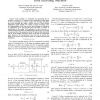Free Online Productivity Tools
i2Speak
i2Symbol
i2OCR
iTex2Img
iWeb2Print
iWeb2Shot
i2Type
iPdf2Split
iPdf2Merge
i2Bopomofo
i2Arabic
i2Style
i2Image
i2PDF
iLatex2Rtf
Sci2ools
112
click to vote
ISCAS
2005
IEEE
2005
IEEE
On the robustness of an analog VLSI implementation of a time encoding machine
Abstract— Time encoding is a mechanism for representing the information contained in a continuous time, bandlimited, analog signal as the zero-crossings of a binary signal. Time decoding algorithms have been developed that make a perfect recovery of time encoded bandlimited signals possible. We consider a simple one-opamp active RC implementation of the time encoder and investigate the robustness in performance of the time decoder when the former is subject to non-idealities of the analog VLSI realization. We show that up to a constant scaling factor, delay and offset the input signal can be accurately reconstructed even if the opamp has a finite DC gain and finite bandwidth and the circuit exhibits parameter offsets. We develop an experimental upper bound for the reconstruction error that can be used in the design of the encoder. The analytical results are verified with numerical simulations.
| Added | 25 Jun 2010 |
| Updated | 25 Jun 2010 |
| Type | Conference |
| Year | 2005 |
| Where | ISCAS |
| Authors | Peter R. Kinget, Aurel A. Lazar, Laszlo T. Toth |
Comments (0)

